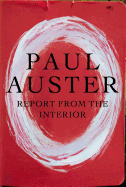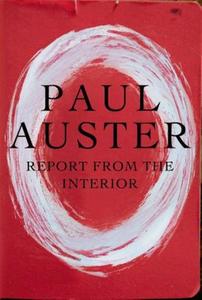

As we learn from the autobiographical impressions of his first 12 years in Report from the Interior, Auster grew up in South Orange, N.J., as a pretty normal kid, "obedient and well-behaved... [but] by no means a saintly child." This is not, however, your typical memoir. First, Auster chooses to tell his story in the second person, perhaps reflecting his later struggle to write a journal ("the problem with the journal was that you didn't know... whether you were talking to yourself or to someone else"). Second, he makes little effort to elaborate the historical facts of those years and instead writes from his "interior." As such, he chooses to focus on special moments that made a significant impact on his intellectual life: his parents' divorce; recognizing that he was Jewish and what that meant; the extraordinary impressions left by three rather diverse movies: The War of the Worlds, The Incredible Shrinking Man and I Am a Fugitive from a Chain Gang. Nearly a third of the memoir is devoted to detailed discussion of how these B-movie stories fueled Auster's life-long sense that an individual's identity can be upended by forces beyond his control.
Somewhat abruptly, Auster digresses from his adolescent years to when his first wife, the novelist and translator Lydia Davis, sends hundreds of pages of their correspondence for him to vet before she donates all of her papers to a research library. He annotates these letters--his real first preserved writing--with the older, second-person narrator's memories of the same times. To put a final trademark Auster question mark to it all, he brings Report from the Interior to a close with an album of archival photos and cinema stills. He leaves us with a picture of the young Auster as a soon maturing young man, self-described as "fitfully trying to hold yourself together as you slowly come apart." This new, somewhat odd Auster memoir adds another piece to the jigsaw puzzle of one of our greatest writers. --Bruce Jacobs
Shelf Talker: One may wonder if we need yet another Auster memoir, but there are wonderful Austerian twists and ruminations here, making for a satisfying addition to his eclectic canon.

